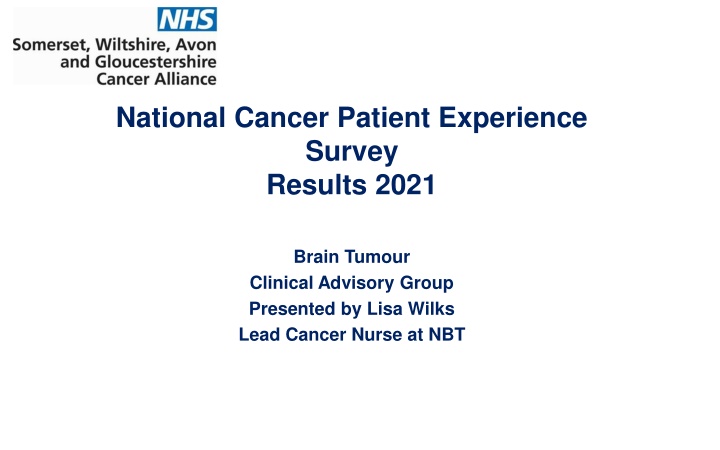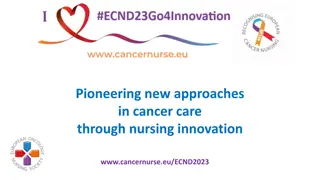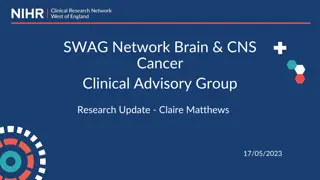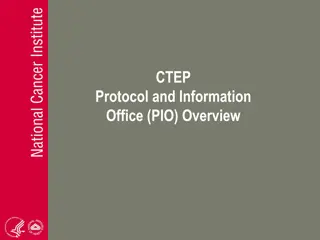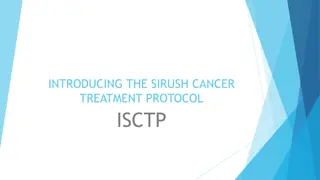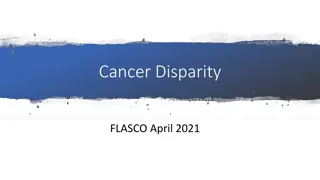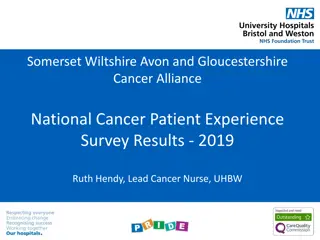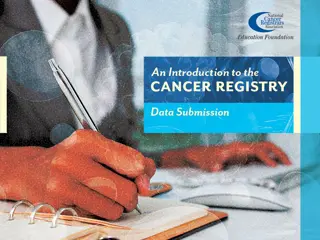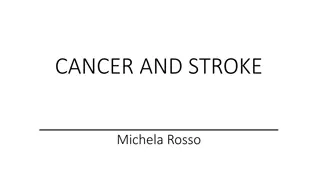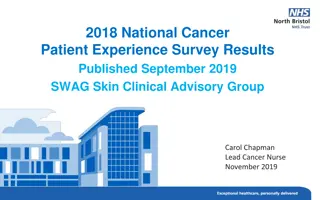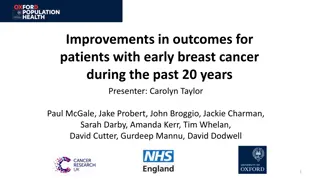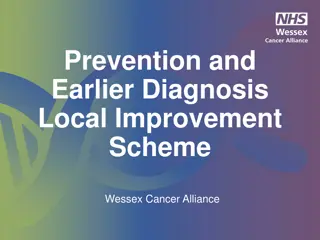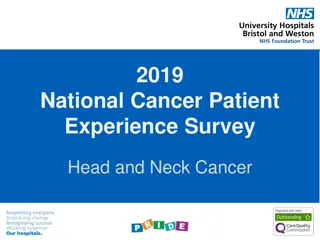National Cancer Patient Experience Survey 2021 Results Overview
National Cancer Patient Experience Survey (NCPES) for 2021 focused on brain tumour patients and was led by Lisa Wilks, the Lead Cancer Nurse at NBT. The survey, commissioned by NHS England, aimed to monitor cancer care progress, drive quality improvements, and inform stakeholders. Methodology included samples of adults diagnosed with cancer in 2021. Reports were published in July 2022, reflecting the experiences of patients within the Cancer Alliance. The SWAG responses highlighted an overall rating of 9.0, exceeding the national average of 8.9, with most questions meeting or exceeding expectations.
Download Presentation

Please find below an Image/Link to download the presentation.
The content on the website is provided AS IS for your information and personal use only. It may not be sold, licensed, or shared on other websites without obtaining consent from the author.If you encounter any issues during the download, it is possible that the publisher has removed the file from their server.
You are allowed to download the files provided on this website for personal or commercial use, subject to the condition that they are used lawfully. All files are the property of their respective owners.
The content on the website is provided AS IS for your information and personal use only. It may not be sold, licensed, or shared on other websites without obtaining consent from the author.
E N D
Presentation Transcript
National Cancer Patient Experience Survey Results 2021 Brain Tumour Clinical Advisory Group Presented by Lisa Wilks Lead Cancer Nurse at NBT
NCPES Introduction Annual survey, commissioned & managed by NHS England (since 2010) last mandatory NCPES 2019 (due to pandemic) new design for 2021, therefore break in series data & limited comparison Picker - responsible for designing, running & analysing the survey Designed to Monitor progress in cancer care Provide information to drive local quality improvements Assist commissioners and providers of cancer care Inform the work various charities and stakeholder groups, supporting cancer patients
NCPES Methodology Provider survey samples Adults (16 and over), with a confirmed diagnosis of cancer Discharged from NHS Trust (after an inpatient or day- case attendance for cancer related treatment) in April, May and June 2021. Survey fieldwork Oct. 2021 Feb. 2022 Reports published July 2022 (National, Alliance, ICS, Trust)
Cancer Alliance report Report reflects experience of people referred from within CA footprint (not all those treatedby that CA s Providers) referring CA report - based on patient home postcodes According to ONS postcode mapping Based on April 2021 STP / ICS position (full new ICB / ICS mapping introduced from July 2022)
Brain Tumour Total SWAG Upper Brian responses: 9 Responses Individual Trusts Gloucestershire Hospitals NHS FT 0 Royal United Hospital Bath NHS FT 0 University Hospitals Bristol & Weston NHS FT 0 Somerset NHS FT Yeovil District Hospital NHS FT 1 0 North Bristol NHS Trust 8 Salisbury NHS FT TOTAL: 0 9
SWAG Summary Overall rating of care 9.0 (national average 8.9) 15 questions were above the expected range (all others were in line with the national average)
SWAG Brain Tumour highest scores >90% 2021 % for SWAG National Average Score Question Q13. Patient was definitely told sensitively that they had cancer 92% 77% Q16. Patient was told they could go back later for more information about their diagnosis 86% 100% Q17. Patient had a main point of contact within the care team 100% 91% Q20. Treatment options were explained in a way the patient could completely understand 92% 84% Q22. Family and/or carers were definitely involved as much as the patient wanted them to be in decisions about treatment options 93% 77% Q24. Patient was definitely able to have a discussion about their needs or concerns prior to treatment 92% 74% Q27. Staff provided the patient with relevant information on available support 91% 93% Q31. Patient had confidence and trust in all of the team looking after them during their stay in hospital 91% 81%
SWAG Brain Tumour highest scores >90% 2021 % for SWAG National Average Score Question 91% Q34. Patient was always able to get help from ward staff when needed 81% Q37. Patient was always treated with respect and dignity while in hospital 100% 90% Q42. Patient completely had enough understandable information about progress with surgery 100% 85% Q44. Possible side effects from treatment were definitely explained in a way the patient could understand 93% 76% Q45. Patient was always offered practical advice on dealing with any immediate side effects from treatment 92% 71% Q46. Patient was given information that they could access about support in dealing with immediate side effects from treatment 100% 87% Q49. Care team gave family, or someone close, all the information needed to help care for the patient at home 9 92% 58%
SWAG Brain Tumour lowest scores >60% 2021 % for SWAG National Average Score Question Q47. Patient felt possible long-term side effects were definitely explained in a way they could understand in advance of their treatment 50% 61% Q52. Patient has had a review of cancer care by GP practice 21% 18%
Cancer Context 3319 responses How long ago were you told you had cancer? Less than 6 months 12% (126) 6 12 months 1 2 years 2 5 years More than 5 years 47% (1550) 77% 18% (594) 13% (412) 10% (311)
Cancer Context continued Who told you that you had cancer? Specialist doctor / consultant 79% (2567) Specialist cancer nurse Someone at your GP practice Another member of the hospital team 3% (90) Someone else / can t remember 2% (69) 11% (348) 5% (161)
Patient comments Patients asked How would you describe your care and treatment? Was there anything that could have been improved? Any other comments Analysis presented by topic and sentiment Trust level thematic comments reports Not able to filter comments by tumour site this year
Somerton NHS FT Key 2021 Trust NCPES message despite high pressures in the system and COVID care received by Cancer patients on the whole remained of a high standard at SFT, both within the Beacon Centre and on general wards. Area of success information provision, especially during diagnostic part of pathway, patients reported not only communication to be of a high standard but also individuals and teams went out of their to provide high quality care and maintain their dignity at all times. Prioritised area for improvement - Inter-organisation communication ensuring key information regarding patient pathway is clear, keeping patient informed clearly of progress, changes and intentions throughout. How the patient interacts with their GP was often commented upon so how we can as an organisation and a provider support this through information sharing, smarter working is being explored where possible PCS treatment summaries, Holistic Needs Assessments, Cancer Support Workers etc. Musgrove Park Hospital is a wonderful hospital I was treated with care and consideration throughout my family was included and if they wanted to speak to someone an appointment could have made easily. I had only moved here a few months before my diagnosis so I knew no one the staff from nurses to consultation made everything so much better I cannot praise them highly enough. The same can be said when I was moved to outpatients at the Beacon Centre.
Yeovil District Hospital NHS FT A great set of results , a good care range of positive outliers and no negative outliers, with an above national average on both overall response with rate of 61% and with patients rating their overall cancer care from the Trust at 9.1 /10 As questions slightly different this year have looked at themes and moreover the comments that we as a trust rely on for better site-specific information are not so accessible. However, as question responses are now given for > 11, for the first time we have some smaller sites such as lung specific information. Notably for us the continued effect of the pandemic but also the significant impact Cancer Support Workers by working with the site specialties were very evident within these results. Main positives : patients receiving details on financial support, privacy when receiving results, staff providing information on the relevant support available, care planning was up to date, support continued through Covid pandemic with the move to off site oncology treatment area, knew main contact and could easily access them, good overall team working and family and carers were supported and given all the information they needed. Points for wider-teams review and consideration are to continue to review and improve patient communication and ensure Personalised care and support (PCS) embedded across all the cancer sites, such as increasing virtual wellbeing clinics, increasing access and scope of supportive information for living with cancer and managing any longer term effects; so likely focus will be: Patient communication from our Trust in improving the communication for our patients and from regional Trusts used by our patients or other organisations. We acknowledge a lot of administration upheavals in the last couple of years due to Covid with often short cancellations of clinics given to patients but we could be more patient centric and streamlined in our communication and opportunistic with other methods, i.e. not just rely on letters. Targeting Information around different treatments e.g. increasing use of immunotherapy , support services, long term effects and living with cancer after the treatment is completed. Using the site-specific information to have more targeted approaches to information whether this is in the nuances of treatments or the supportive care such as long term side effects and lastly how we improve primary and secondary care sharing communication In spite of the hospital having difficulty appointing a new consultant after mine moved on, I never felt as though I wasn't being monitored or looked after. In fact, my specialist nurse went above and beyond the call of duty to make sure nothing was missed. She was exceptional. I have complete confidence in the systems used and the way staff use them to give patients the very best care. I cannot commend Yeovil District Hospital highly enough.
North Bristol Trust At NBT Patients scored the Trust 9 out of 10 for the 'overall experience of care' question. Nationally, patients gave an average rating for overall experience of care of 8.92. 470 patients took the time to complete the survey, providing over 800 free text comments about their experience which are data rich and analysis in progress. Areas of success include evidence that personalised care and support is making a difference. The free text comments provide insight into the patient experience in relation to communication and information identifying areas for improvement: Co-ordination of appointments Communication between hospital GP Consistency of HCP The care I have and continue to receive from the Cancer Team is excellent both in terms of quality of delivery from the consultant and her team, and, the continuity of care. I have been fortunate to have had consultations, face to face and on the telephone, with the same consultant each time. This has given huge reassurance and consistency of information / advice, during a time of anxiety having been given a diagnosis of cancer .
Royal United Hospitals Bath NHS FT 531 responses with a 60% response rate Free text responses overwhelmingly acknowledging the difficulties of Covid, but thankful that despite the pandemic, cancer services continued and praise for staff. Successes- access to support and advice from a main point of contact, together with patients receiving clear information regarding diagnostic investigations, surgery and radiotherapy , access to staff who provide information on support and create plans of care. Patients felt treated with dignity and respect Areas of focus for development- to provide clear and understandable advice on the management of side effects both immediate and long term, To ensure patients are kept informed regarding progress of their treatment. I felt the care & treatment I received was brilliant! I was well informed and looked after every step of the way. I couldn't have asked for any more.
University Hospitals Bristol and Weston NHS FT 585 responses (55%): 87% white British, 65% IMD quintiles 4&5, 10% (56) <45yrs 9/10 for overall experience of care Key message positive reflection of 2021 experience, especially with context of the pandemic. Commitment to gathering feedback from a wider demographic. Successes impact of Personalised Care & Support (e.g. access to support, care plan); information giving; waiting times for treatment and in clinic; multiple comments describe positive staff attributes, care quality and treatment. Priorities for improvement Access to support from GP practice and community services Communication supporting shared care Specific information for long term side-effects, immunotherapy, hormone treatment and getting a second opinion. Not just first class it was world class. I cannot praise everyone involved enough and I will never be able to thank them enough. Their care, skill and medical excellence enabled my treatment, recovery and healing to progress efficiently and effectively.
Salisbury NHS FT 339 patients were invited to complete the survey, 212 patients responded. The Trust response rate was 63% compared to national average of 55% receiving 420 comments. Trust score for Overall patient experience and care was 8.8 compared to a national average of 8.9. The Trust received 5 positive outliers and 1 negative outlier. Areas of Success Financial support highlighting the success of CSW across all tumour sites Involvement of family with treatment decisions Prioritised Areas for Improvement Help from ward staff, with post operative care, medications, information and advice- Plan for Macmillan to fund Practice Educator in Cancer Care for ward education. Information availability- Plan for Macmillan to fund information centre I have had fantastic treatment from the NHS trust where I received my diagnosis and treatment. Every department I have had contact with has been full of caring and compassionate staff which has made the whole experience so much easier. I was referred immediately into the 2 week wait clinic by my GP where I received all the tests I needed straight away - within 45 mins of my appt. Time I had a discussion with the consultant who was able to tell me that they were fully certain I had cancer, I had surgery within 2 weeks of this and chemo started within 6 .
Gloucestershire Hospitals NHS FT Unable to provide an update at present, due to changes in personnel. This will now be picked up by the newly appointed GHFT Lead Cancer Nurse.
Initial SWAG observations Personalised Care and Support (PCS) is making a tangible difference need to continue to expand access Theme of low scores relating to communication and shared care, between care providers, Trusts, departments Information giving (including side effects, immunotherapy) access to support from community & primary care services Positive reflection of many services, given the context of the pandemic
Clinical Advisory Group - Next Steps Discuss and agree SWAG Brain Tumour patient experience improvement priorities (to be collated and fed back to SWAG Cancer Board) Next steps / timeline Nominated lead Recognition of areas of good practice Consider / plan additional in-year Brain Tumour patient experience activity to gain further insight
SWAG next steps Further analysis and discussion By ethnicity, deprivation, tumour site At Trust level Across shared ICS pathways Across shared SWAG pathways (at Alliance CAGs) Further embed and expand access to PCS Triangulation with ongoing QoL survey results
